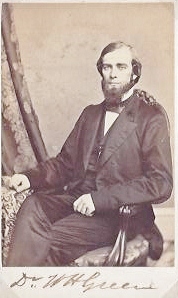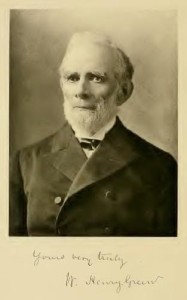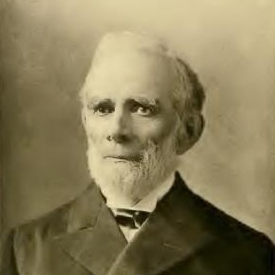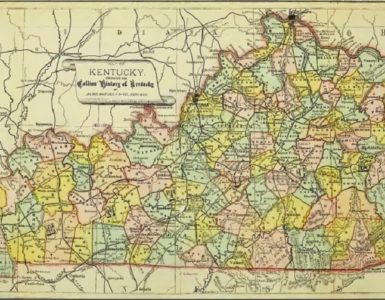The son of George Smith and Sarah (Kennedy) Green named William was born January 27, 1825, at Groveville, Burlington County, New Jersey. He united with the First Presbyterian Church in Easton, Pennsylvania, at the age of fifteen. His preparatory studies were pursued in Easton under the tutelage of Rev. John Vandeveer. He graduated Lafayette College at the age of fifteen in 1840 and continued there for two years as a tutor. William then entered Princeton Seminary in 1842 and completed his course in 1846. His studies had been interrupted for a year because he served as an adjunct professor of mathematics in Lafayette College.
 Having completed his studies for the ministry, William H. Green was licensed by the Presbytery of New Brunswick, February 3, 1846, and was two years later ordained an evangelist by the same presbytery. During his two years as a licentiate, he was an instructor in Hebrew at the seminary. Following his ordination, he continued teaching Hebrew for one more year. During these three years he served both of the Presbyterian churches in Princeton as stated supply, after which he was called to be the pastor of Central Presbyterian Church in Philadelphia. However, after serving the Central Church for just two years, his call was dissolved July 7, 1851, so he could accept the call to the Chair of Biblical and Oriental Literature at Princeton Seminary. Dr. Green continued in that calling until his death fifty-four years after his appointment as an instructor in the Seminary and forty-nine years after his return to Princeton from Philadelphia to assume the work of a full professorship. As with many of the seminaries of the day, he served double duty in that from 1851 to 1871 he was also the seminary librarian. For a number of years before his death, Dr. Green suffered from an incurable and debilitating disease that gradually weakened him, but sometimes he would rally from periods of great weakness with a renewed vigor. However, on February 10, 1900, William Henry Green died at the age of seventy five.
Having completed his studies for the ministry, William H. Green was licensed by the Presbytery of New Brunswick, February 3, 1846, and was two years later ordained an evangelist by the same presbytery. During his two years as a licentiate, he was an instructor in Hebrew at the seminary. Following his ordination, he continued teaching Hebrew for one more year. During these three years he served both of the Presbyterian churches in Princeton as stated supply, after which he was called to be the pastor of Central Presbyterian Church in Philadelphia. However, after serving the Central Church for just two years, his call was dissolved July 7, 1851, so he could accept the call to the Chair of Biblical and Oriental Literature at Princeton Seminary. Dr. Green continued in that calling until his death fifty-four years after his appointment as an instructor in the Seminary and forty-nine years after his return to Princeton from Philadelphia to assume the work of a full professorship. As with many of the seminaries of the day, he served double duty in that from 1851 to 1871 he was also the seminary librarian. For a number of years before his death, Dr. Green suffered from an incurable and debilitating disease that gradually weakened him, but sometimes he would rally from periods of great weakness with a renewed vigor. However, on February 10, 1900, William Henry Green died at the age of seventy five.
W. H. Green was honored with the Doctor of Divinity by both Princeton University in 1857 and the University of Edinburgh in 1884, to which was added the LL.D. by Rutgers College in 1873. In 1868, he was elected to succeed President Maclean at Princeton University, which he declined, but he did serve the university as a trustee from 1868 until his death.
The General Assembly of the PCUSA elected him its moderator for the meeting in Detroit in 1891. It was a particularly difficult assembly because the massive and ornately decorated First Church was packed to overflowing because of issues to be addressed regarding the teaching of C. A. Briggs of Union Seminary.  Green’s leadership of the assembly was challenged further by the tragic death of Samuel Miller Breckinridge as he collapsed to the floor having just completed a committee report. As was sometimes the case, Dr. Green’s illness so weakened him in 1892 that he was unable to attend the General Assembly in Portland. Green’s inability to attend the meeting as the retiring moderator did not prohibit him from supplying his moderator’s sermon for reading to the assembly and seeing it published in The Presbyterian Banner, May 25, 1892. The sermon was an exposition of Isaiah 45:15, “Verily thou art a God that hidest thyself, O God of Israel, the Savior.”
Green’s leadership of the assembly was challenged further by the tragic death of Samuel Miller Breckinridge as he collapsed to the floor having just completed a committee report. As was sometimes the case, Dr. Green’s illness so weakened him in 1892 that he was unable to attend the General Assembly in Portland. Green’s inability to attend the meeting as the retiring moderator did not prohibit him from supplying his moderator’s sermon for reading to the assembly and seeing it published in The Presbyterian Banner, May 25, 1892. The sermon was an exposition of Isaiah 45:15, “Verily thou art a God that hidest thyself, O God of Israel, the Savior.”
On May 5, 1896, the fiftieth anniversary of Dr. Green’s appointment as an instructor in Princeton Seminary was celebrated with appropriate addresses in Alexander Hall on the campus of Princeton University. This commemoration occurred in conjunction with the annual commencement of the seminary and was attended by many distinguished representatives of other institutions. The proceedings were published in a volume that includes a complete bibliography of the numerous writings to come from Dr. Green’s pen. A brief statement was made at the anniversary meeting by Ethelbert D. Warfield as the representative of Green’s alma mater, Lafayette College. At the time, Ethelbert had been serving in the college as Professor of History and Political Science, a trustee, and its president for about five years. He would continue at Lafayette until 1914 and would see his brother, Benjamin Breckinridge Warfield, given the Litt.D. by Lafayette in 1911. In Ethelbert’s brief comments to Dr. Green and the gathering, he said—
It has been your peculiar privilege to occupy a position in which you have been able to render a great and notable service to the highest truth. In a day of prevalent apostasy, in a time when knowledge is exalted and wisdom is despised, you have embraced the opportunity, which so many have refused, to speak words of soberness and strength in defense of the Word of God. Your alma mater, mindful of all your faithfulness in many labors, congratulates you especially on the courage and modesty which have united to make so great a service possible.…God grant that you may long continue to open to successive classes the Word of God….
Dr. Green was a prolific writer and his subject matter was most often in his area of specialization, though he sometimes wrote on other subjects. His first piece for Biblical Repertory and Princeton Review (BRPR) was a review of Keil’s commentary on Joshua in 1850. Most of his contributions to serials were printed in BRPR, but he also wrote for its successors Presbyterian Quarterly and Princeton Review, Presbyterian Review, and the Presbyterian and Reformed Review. From 1883 to 1892, he wrote the critical notes on the International Sunday School Lessons that appeared in The Sunday School Times published in Philadelphia. As the moderator of the General Assembly that was dealing with the Briggs Case in 1891, he handled the gavel having published in The Evangelist, July 23, 1885, “A Reply to Dr. Briggs on the Revised Version of the Old Testament,” and just before the assembly met, “Dr. Briggs’s Inaugural Address,” in the New York Observer of April 16, 1891. Some of his books include Grammar of the Hebrew Language, 1861; The Pentateuch Vindicated from the Aspersions of Bishop Colenso, 1863; An Elementary Hebrew Grammar with Tables, Reading Exercises, and a Vocabulary, 1868, 1871; A Hebrew Chrestomathy, or, Lessons in Reading and Writing Hebrew, 1872; The Argument of the Book of Job Unfolded, 1874; The Hebrew Feasts, 1885; The Higher Criticism of the Pentateuch and The Unity of the Book of Genesis, both in 1895; and the two volumes, General Introduction to the Old Testament, The Canon, 1898, and General Introduction to the Old Testament, The Text, 1899.
William Henry Green died February 10, 1900. He was survived by his second wife, Elizabeth Hayes, whom he married on April 28, 1858, at Allegheny, Pennsylvania, and by two daughters. Both daughters were married to Princeton University Professors—one was married to William Libbey and the other to J. Mark Baldwin. Dr. Green was married first to Mary Elizabeth Colwell on June 24, 1852, who died less than two years later on March 29, 1854.
Barry Waugh
Sources—Clarification editing was done by the author on August 5, 2015. The portrait of the younger Dr. Green is from a CDV owned by the author of this biography. This biography relies heavily upon the memorial for Dr. Green included in Necrological Reports and Proceedings of the Alumni Association of Princeton Theological Seminary, Vol. 3, 1900-1909, published in 1909, as found on pages 14-16. The bibliographic information for the book published with the proceedings of Dr. Green’s fiftieth anniversary celebration is, Celebration of the Fiftieth Anniversary of the Appointment of Professor William Henry Green as a Professor of Princeton Theological Seminary, May 5, 1896, New York: Charles Scribner’s Sons, 1896.
Notes—One should exercise care when speaking or writing of Alexander Hall in the village of Princeton because both the university and the seminary have buildings with that name. At the seminary it is named for founding professor Archibald Alexander, but at the university, Alexander Hall was donated by Harriet Crocker Alexander in honor of her husband, Charles B., his father, Henry M., and Charles’s grandfather, Archibald Alexander, all of which were trustees. So, in a way, both Alexander Halls were named for Archibald Alexander, D.D.





